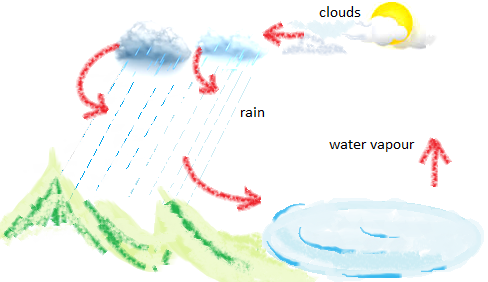Factor Behind Clouds and Rain
How the sun is the main factor behind clouds and rain?
We know that due to heat from the sun shines down on the earth the water of oceans, rivers, lakes, ponds, etc gets evaporated so, the air along with the water vapour, gets warm and rises up.
As it goes higher up in the sky, it cools down.
The water vapour condenses to form tiny drops of water. Millions and millions of these droplets together form a cloud.
When the clouds pass through cooler air, they get further cooled. The water drops becomes bigger and heavier. When they become very heavy, they fall to the ground as rain. So, from here we understand that the sun is the main factor in influencing weather by giving heat to form clouds and pour rain drops.
Most of the water that falls on land goes back into the oceans, rivers, lakes, ponds, etc. Again at a certain altitude the vapours changes into clouds and clouds into rain.
This goes on repeating. This repeated change of water to water vapour, and then back to water, is called the water cycle.
From Factor Behind Clouds and Rain to HOME PAGE
Recent Articles
-
Plants Around Us | Big & Small Plants | Shrubs & Herbs | Water Plants
Feb 03, 26 02:01 AM
We see different types of plants around us. Plants are living things. They breathe and grow. They also reproduce. Most of the plants grow on land. Some plants grow in water. -
Formed Elements of Blood | Erythrocytes | ESR |Leukocytes |Neutrophils
Jan 15, 26 01:25 AM
Formed elements formed elements are constitute about 45 % of blood afeias haematocrit value packed cell volume mostly of red blood corpuscles and are of 3 types- erythrocytes, leukocytes and blood pla… -
What Is Plasma? | Blood Plasma | Proteins | Nutrients | Cholesterol
Nov 07, 25 10:29 AM
Blood is a mobile fluid which is a connective tissue and is derived from the mesoderm like cell any other connective tissue. Colour of blood is reddish and that flows inside the blood vessels by means… -
Disorders of Respiratory System | Tuberculosis | Pleurisy | Emphysema
Oct 28, 25 11:39 PM
Tuberculosis is very common disease and is caused by a type of bacteria called Mycobacterium tuberculosis. This disease causes different trouble in the respiration and infection of several parts of th… -
Regulation of Respiration | Respiratory Centres | Inspiratory Area |
Oct 14, 25 12:13 AM
Respiratory Centre is the area that controls the rate of respiration and it is observed to be located in medulla oblongata and pons. Respiratory Centre has the following will dispersed components like…






New! Comments
Have your say about what you just read! Leave me a comment in the box below.